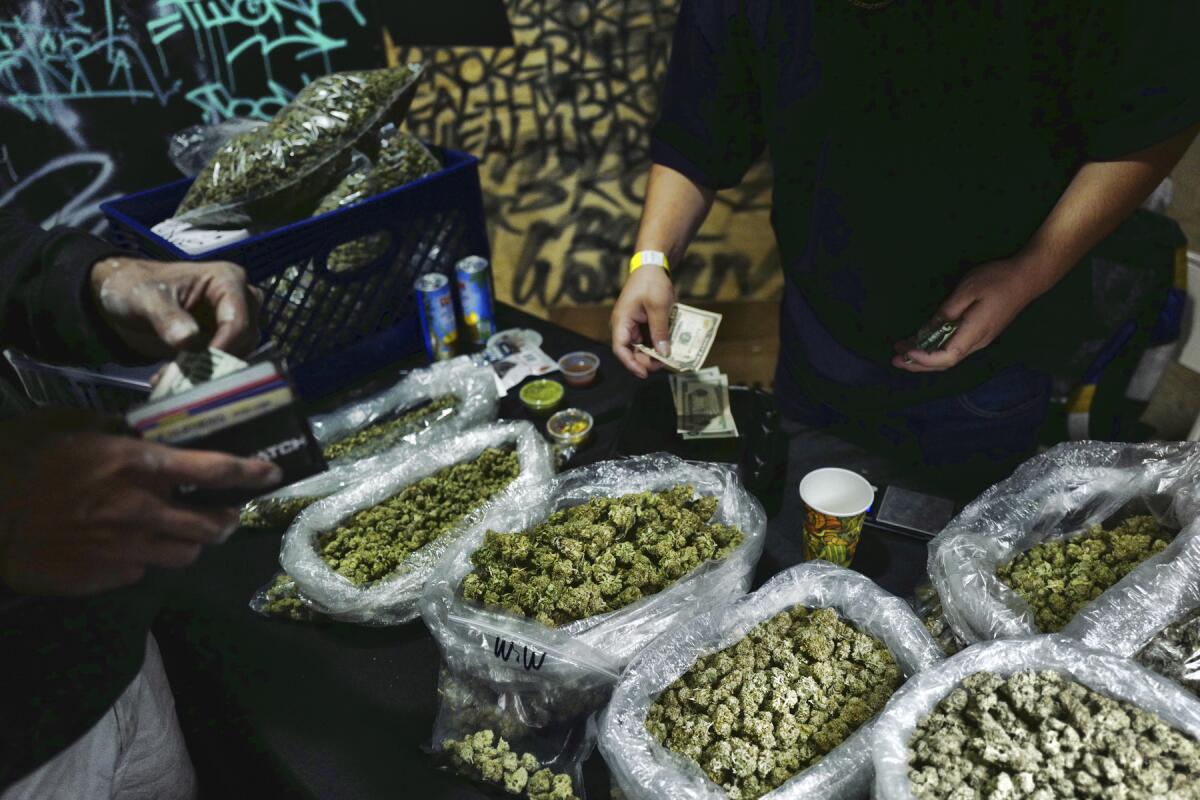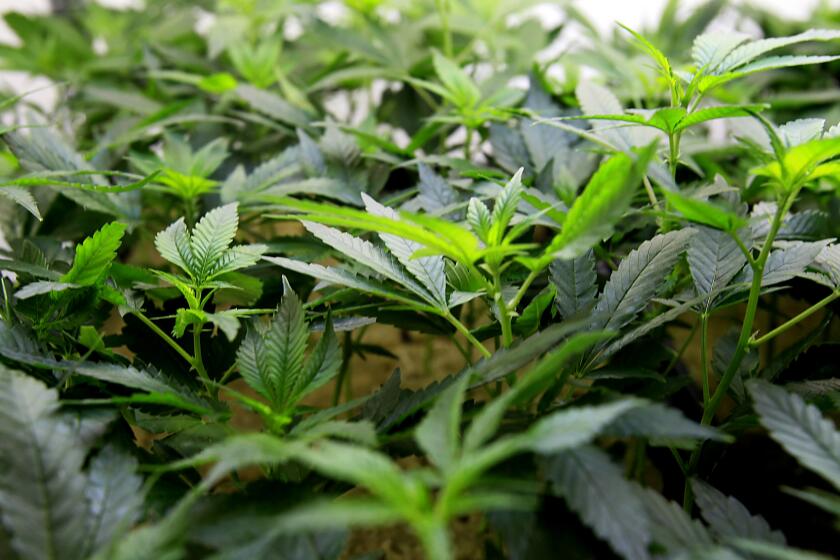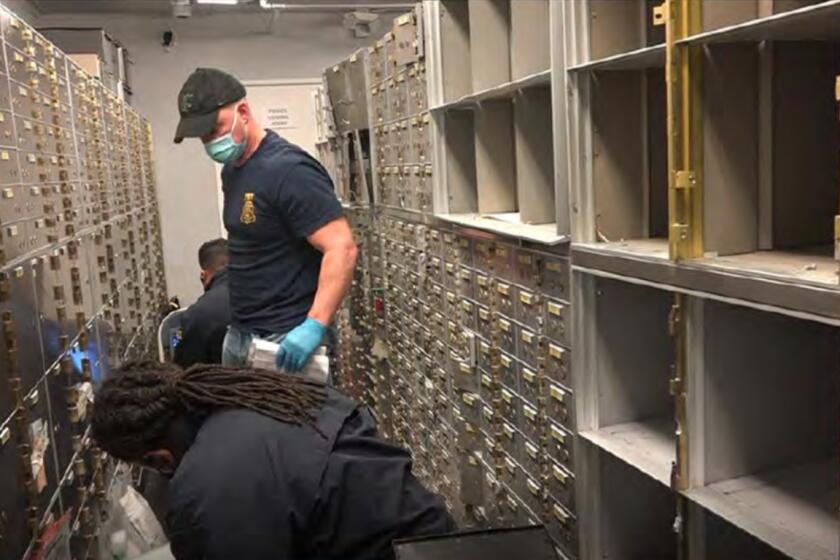FBI gives up attempt to confiscate more than $1 million in California pot-store cash

- Share via
The FBI has abandoned its attempt to confiscate more than $1 million in cash that was seized from armored cars transporting the money for state-licensed marijuana businesses in California.
The FBI’s return of the money signals a retreat by the U.S. Justice Department from an aggressive legal move that could have disrupted the operation of marijuana outlets that are legal under California law but violate federal law.
The FBI initially alleged that the $1.1 million, seized last year from armored cars pulled over by San Bernardino County sheriff’s deputies in Barstow and Rancho Cucamonga, was tied to federal drug or money-laundering crimes, but nobody was charged.
The cash seizures — and another from the same armored-car company in Kansas — gave rise to suspicions the Justice Department under President Biden was working to thwart the operations of licensed marijuana businesses in California and the 36 other states that have legalized pot possession.
Empyreal Logistics, the company whose armored cars were carrying the seized currency, sought a court order in January to force the FBI and Sheriff’s Department to stop pulling over its vehicles and taking the cash without evidence of illegal activity. On Friday, U.S. District Judge Fred W. Slaughter dismissed the case after the parties reached a deal to settle the dispute.
An armored car company says the FBI and the San Bernardino County sheriff unlawfully seized cash from state-licensed marijuana businesses.
Thom Mrozek, a spokesman for the U.S. attorney’s office in Los Angeles, declined to provide details on why the government agreed last month to drop its allegations and return the money.
“This was a decision considering the totality of the circumstances in this case,” he said.
The case revived allegations of forfeiture abuses by federal law enforcement agencies in California.
More than a dozen lawsuits forced the FBI and U.S. attorney’s office in Los Angeles to return tens of millions of dollars in cash and valuables seized last year from safe deposit boxes in Beverly Hills after the government failed to produce evidence of criminal wrongdoing.
The FBI’s attempt to confiscate tens of millions of dollars from Beverly Hills safe deposit boxes draws resistance and charges of government misconduct.
In the armored-car case, proceeds from the cash forfeiture would have been split between the FBI and the San Bernardino County Sheriff’s Department. Shannon Dicus, the county sheriff, has waged a high-profile crackdown on illegal marijuana farming in the high desert.
On Friday, Dicus and Empyreal released a joint statement saying they “understand that each were acting in good faith when the stops were conducted.”
“Both sides also acknowledge that Empyreal is part of the solution to help with financial transparency and that San Bernardino deputies are not highway robbers as previously reported in the media,” the statement said.
Empyreal’s lawsuit described the traffic stops of their armored cars as “highway robberies” by law enforcement agencies seeking to fund their operations with cash taken through forfeiture. It also accused the Sheriff’s Department of violating a California law that safeguards the transportation of cash for licensed marijuana businesses.
Empyreal, based in Pennsylvania, deploys armored cars to carry cash for pot dispensaries, convenience stores and other clients in many states. The company says it takes pains to comply with U.S. Treasury Department guidelines on how to handle cash for state-licensed marijuana businesses.
The Justice Department’s policies toward licensed marijuana operations have left the businesses vulnerable to federal law enforcement.
In 2013, a memo by then-Deputy Atty. Gen. James M. Cole advised U.S. attorneys in states that have legalized marijuana to ignore all but the most serious cases, such as those involving violent gangs or cartels. The Trump administration rescinded the memo, but federal marijuana prosecutions in California remained rare.
The U.S. attorney general under Biden, Merrick Garland, has told Congress that marijuana prosecutions were generally not a good use of limited federal resources during an opioid and methamphetamine epidemic.
But federal prosecutors continue to prosecute some marijuana dealers.
And the U.S. attorney’s office in Wichita, Kan., is trying to confiscate $165,620 that a local sheriff seized a year ago from an Empyreal armored car that was transporting the cash for medical marijuana businesses in Missouri, a state that has legalized medical pot.
Agents of the U.S. Drug Enforcement Administration put the Missouri dispensaries under surveillance, followed the armored car and coordinated the cash seizure and attempted forfeiture with the sheriff in Kansas, where marijuana sales remain illegal.
More to Read
Sign up for Essential California
The most important California stories and recommendations in your inbox every morning.
You may occasionally receive promotional content from the Los Angeles Times.













